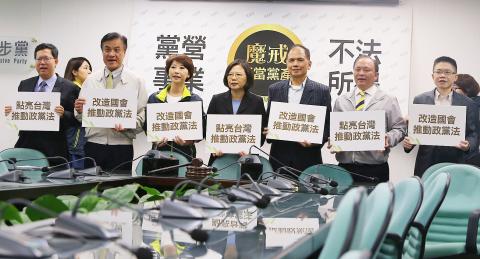The Democratic Progressive Party’s (DPP) Central Standing Committee yesterday adopted a resolution aimed at regulating political party assets, while prohibiting parties to run businesses, specifically targeting the Chinese Nationalist Party (KMT).
“The issue of party assets is not only something concerning the nation’s transitional justice, it would also damage democracy in Taiwan, as it creates unfair competition,” DPP Chairperson and presidential candidate Tsai Ing-wen (蔡英文) told a news conference following the committee’s meeting in Taipei.
“After the next legislature is inaugurated, the DPP will seek to cooperate with all parties to pass a [proposed] political party act, which would define a political party as a non-profit organization, limiting its sources of funding to membership fees, political donations made according to the law, government subsidies and interest thereof,” she added.

Photo: CNA
Tsai said party-run businesses are the “cancer of democracy,” adding that they should be strictly prohibited.
“Although the KMT says that it has put all of its party assets into trust, it is still able to profit from interests via operations and handling of [companies’] assets, leading to unfair competition among political parties,” she said.
In addition to prohibiting political parties from running businesses, Tsai said that there should also be a law to address illegitimate party assets.
“I would like to call on [KMT chairman] Eric Chu [朱立倫] to cease selling off KMT assets,” Tsai said. “As for business leaders, I would like to urge them to not be involved in transactions concerning KMT assets based on corporate social responsibility and ethics, to avoid being trapped in disputes in the future.”
One of the richest political parties in the world, the KMT controversially obtained many of its party assets after taking over properties left by the Japanese after World War II, although the properties should be owned by the government, not a political party.

Taiwan is projected to lose a working-age population of about 6.67 million people in two waves of retirement in the coming years, as the nation confronts accelerating demographic decline and a shortage of younger workers to take their place, the Ministry of the Interior said. Taiwan experienced its largest baby boom between 1958 and 1966, when the population grew by 3.78 million, followed by a second surge of 2.89 million between 1976 and 1982, ministry data showed. In 2023, the first of those baby boom generations — those born in the late 1950s and early 1960s — began to enter retirement, triggering

ECONOMIC BOOST: Should the more than 23 million people eligible for the NT$10,000 handouts spend them the same way as in 2023, GDP could rise 0.5 percent, an official said Universal cash handouts of NT$10,000 (US$330) are to be disbursed late next month at the earliest — including to permanent residents and foreign residents married to Taiwanese — pending legislative approval, the Ministry of Finance said yesterday. The Executive Yuan yesterday approved the Special Act for Strengthening Economic, Social and National Security Resilience in Response to International Circumstances (因應國際情勢強化經濟社會及民生國安韌性特別條例). The NT$550 billion special budget includes NT$236 billion for the cash handouts, plus an additional NT$20 billion set aside as reserve funds, expected to be used to support industries. Handouts might begin one month after the bill is promulgated and would be completed within

NO CHANGE: The TRA makes clear that the US does not consider the status of Taiwan to have been determined by WWII-era documents, a former AIT deputy director said The American Institute in Taiwan’s (AIT) comments that World War-II era documents do not determine Taiwan’s political status accurately conveyed the US’ stance, the US Department of State said. An AIT spokesperson on Saturday said that a Chinese official mischaracterized World War II-era documents as stating that Taiwan was ceded to the China. The remarks from the US’ de facto embassy in Taiwan drew criticism from the Ma Ying-jeou Foundation, whose director said the comments put Taiwan in danger. The Chinese-language United Daily News yesterday reported that a US State Department spokesperson confirmed the AIT’s position. They added that the US would continue to

IMPORTANT BACKER: China seeks to expel US influence from the Indo-Pacific region and supplant Washington as the global leader, MAC Minister Chiu Chui-cheng said China is preparing for war to seize Taiwan, Mainland Affairs Council (MAC) Minister Chiu Chui-cheng (邱垂正) said in Washington on Friday, warning that Taiwan’s fall would trigger a regional “domino effect” endangering US security. In a speech titled “Maintaining the Peaceful and Stable Status Quo Across the Taiwan Strait is in Line with the Shared Interests of Taiwan and the United States,” Chiu said Taiwan’s strategic importance is “closely tied” to US interests. Geopolitically, Taiwan sits in a “core position” in the first island chain — an arc stretching from Japan, through Taiwan and the Philippines, to Borneo, which is shared by